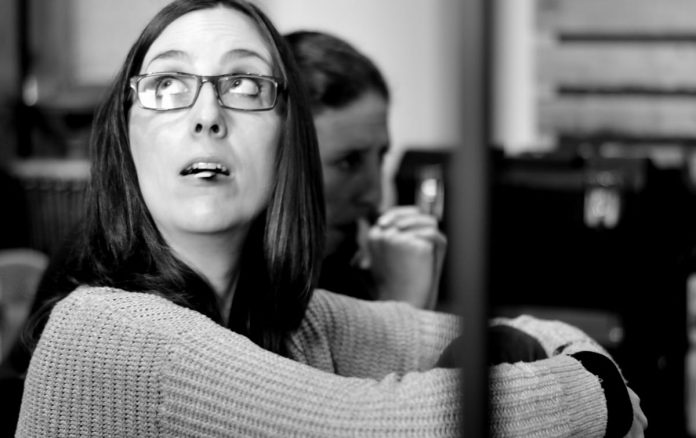Reviewing a concert by Mike Westbrook’s Uncommon Orchestra for the JJ website in April 2016 I singled out a young alto player from the hugely talented pan-generational personnel. The fire and adventurousness of Roz Harding’s playing seemed to channel the spirit of two of Westbrook’s most individual early band members, Mike Osborne and Bernie Living, without actually sounding much like them. I was therefore surprised by some of her acknowledged influences, like Bob Dylan and Manic Street Preachers, alongside the more-expected Jackie McLean.
‘I have received odd comments in the past: being told I play like a man, where did I get all that puff from, how helpful I am for carrying in the musicians’ gear’
She explained “These are from the beginning. They’re imaginative musicians who leave no emotion unturned and keep me going. I was devoted to bands in my youth. I still slightly dream of being in a rock band, belonging with people in a band bubble! Art Pepper was the first saxophonist to capture my imagination, he sounded very human.
“I asked my parents if I could learn saxophone after watching a county youth band. They bought me a second-hand La Fleur alto which I took to the school orchestra, aged about 10. I didn’t know I liked jazz as such, but liked making things up. I was given tapes of Stan Getz and Spyro Gyra in a Christmas stocking, recommended to my mum via my sax teacher. That’s probably the first moment I actively listened to jazz. The most memorable jazz experience was with Exeter College Big Band. I remember those gigs vividly: heart-thumping nerves walking out to the solo mic to play to a real audience. It was these college years that got me hooked!”
She had played with several bands previously but says “There is definitely a sense of life before and after Westbrook! The Westbrooks live jazz and are highly devoted to their projects. I love this intensity. I need to improvise and cannot imagine life without that outpour. Mike and Kate lead the way with this lifelong, living-it approach. I am grateful to play alongside them and their longstanding collaborators. Sitting-in is the best education you could dream of. I can’t really explain all I have experienced, it’s still unfolding but will probably creep into my playing as and when it’s ready”.
In general, jazz has tended to ghettoise women as singers or pianists, but lately female brass and reed players have been more in evidence. I asked Harding whether she felt things were improving.
“It never crossed my mind that I shouldn’t be a jazz saxophonist. I didn’t notice that it was more unusual to be a female jazz musician until I went to university, where there were initially only two other female students in my year. This was a surprise. I was a very insecure musician and found university quite overwhelming anyway. It just seemed like another factor in this new environment. I have received odd comments in the past: being told I play like a man, where did I get all that puff from, how helpful I am for carrying in the musicians’ gear.[!!] Sometimes you wonder if you have been passed over for opportunities. What sort of playing does spring to mind if you mention the sax player is female? Are people really listening or have they just seen a female saxophonist and observed that fact only?”
Someone once commented that her Supermood trio wasn’t helping the gender imbalance as the other members, guitarist Mike Outram and drummer Jim Bashford, were male. “I admired their playing and felt they could help realise my ideas. You just seek musicians you can connect with, who enable you to be you. Things must be improving but it’s still rare for my female students to follow jazz beyond university and embrace it as a profession. The overall image of jazz has some hang-ups which can make it inaccessible and limiting. I can’t stand the shaming attitude that still happens: being “roasted” at jams, only rated if you can play this tune, or at this tempo etc. I am not interested in that and maybe others are put off by it too”.
Harding is heavily involved in education at all levels. You can find out about her work in this field (including Jazz Toast which she launched for young musicians to showcase compositions, arrangements and collective improvisation) on her website.
Last summer three releases featured her impassioned, inspired playing: Supermood (Leo Records 761), Dave Holdsworth’s Wodji (Capton 01) and Kate Westbrook’s Granite (Westbrook WR003) as well as Mike Westbrook’s In Memory of Lou Gare (Westbrook WR002).


























